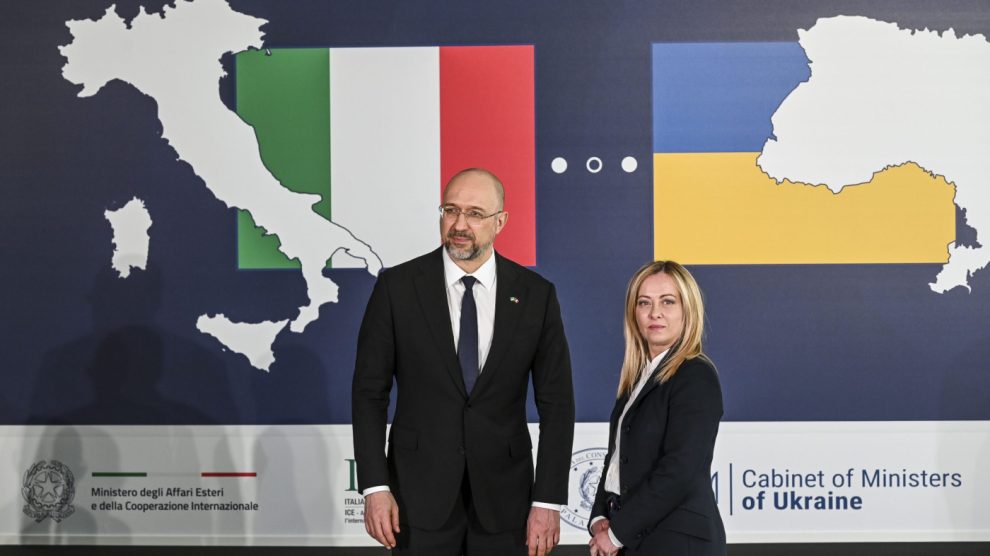Wednesday’s Ukraine Reconstruction Conference, which took place in Rome, was an occasion for Italian and Ukrainian politicians and companies to draw up plans to rebuild the invaded country. The event saw the participation of Italian Prime Minister Giorgia Meloni and her Ukrainian counterpart Denys Shmyhal, as well as President Volodymyr Zelensky, connected via video link, along with several key ministers, multilateral institutions and representatives of over 1,000 Italian companies.
- Beyond medium to long-term projects, the main focus was providing support for the most urgent reconstruction efforts. On Thursday, over 600 companies will engage in closed-door thematic conferences, as well as B2B and B2G encounters, to offer their advice and services for the “fast recovery” phase.
In Italy’s own words. The Italian PM stressed that Italy “will continue to do its part in supporting Ukraine economically, militarily and in [its] reconstruction for today and especially for tomorrow.” The process of reconstruction, she added, “concerns us all because it is a piece of European reconstruction […] from our point of view it is one of the most prudent and far-sighted investments that can be made at this time. We want to involve the private sector, our companies, and our know-how.”
- Deputy PM and Foreign Minister Antonio Tajani stressed that “Russia will pay for the damage caused by the invasion” and highlighted that Rome would provide “the best of the Italian system in its chains of excellence” to support Ukraine’s reconstruction. “The know-how of four million SMEs is at the disposal of our Ukrainian friends.
- Infrastructure and finance are key sectors in which Italy wants to play a leading role, he added, with a view to consolidating a virtuous partnership’ and emphasising that we need to pool resources and projects, private capital and public capital.
- Later, PM Meloni announced that Italy is a candidate to host the Ukraine Recovery Conference in 2025 – which would follow London’s in 2023 and Berlin’s in 2024.
By the numbers. Speaking at the conference, Italian Economy Minister Giancarlo Giorgetti noted that Ukraine will require an estimated $400 billion between 2023 and 2033. He then highlighted that over $100 billion had already been mobilised and announced Rome’s contribution to the newly-established European Investment Bank guarantee fund “EU for Ukraine” amounting to €100 million.
- Gelsomina Vigliotti, the head of the EIB, noted that the institution had already granted $2 billion and that Kyiv needs $14 billion for its most urgent priorities in 2023. She added that the bank is “ready to support its Italian partners” in their reconstruction efforts.
- PM Meloni added that Rome (through State holdings SACE and SIMEST) “is ready to allocate another billion to restart the Ukrainian healthcare sector […] and give support through direct investments to create new companies in Ukraine.”
“Made in Ukraine” coming up. Then the Italian Minister of Enterprise Adolfo Urso signed a Memorandum of Understanding with Deputy Prime Minister and Economy Minister Julija Svyrydenko, aimed at developing the “Made in Ukraine” brand to support Ukrainian products and enterprises by leveraging Italy’s specific expertise.
- Kyiv had already asked Italy for technical assistance in the creation of the brand during Minister Urso’s January visit; he had noted the creation of the brand and the identification of typical Ukrainian products could contribute to their purchase.
- The MoU envisages bilateral collaboration between SMEs (in light of Italy’s traditional experience in primary sectors) and support in the commercial promotion of Ukrainian products on digital platforms and at Italian trade fairs.
Transport and construction. Deputy PM and Transport and Infrastructure Minister Matteo Salvini pointed out the main areas in which Italian companies are well-placed to aid, starting with the construction sector (he mentioned the agreements signed by Webuild and Mermec and highlighted the presence of FS CEO Luigi Ferraris).
- “The second decisive factor is represented by logistics,” he added, referring to the completion of trans-European transport networks and the role of seaports, namely Trieste, Venice and Ravenna.
- Thirdly, Rome can aid in the regulatory and normative framework. “We are ready to immediately start forms of cooperation to define the technical standards that will be fundamental for the realisation of infrastructural works, especially in the field of railways and urban planning.”
Ukraine’s response. President Zelensky thanked participants and PM Meloni personally for their support. Ukraine will never give up its territories, he reiterated, but “we want to rebuild them so that [Ukrainians] can live in safety.” He pointed at Italy’s “excellence” in the construction of smart grids and defence know-how as assets that may bolster Ukraine’s resilience. He also noted that Kyiv could replace Moscow in supplying several key materials – such as lithium and natural gas – to global markets.
- “We had a very concrete meeting on Euro-Atlantic integration and the war,” stated PM Shmyhal, recalling that the only way for the war to end is for Russia to exit the occupied territories and stressing that Italy “played a fundamental role” in Ukraine obtaining the status of EU candidate country. “We thank you for your solidarity; this brings Ukraine closer to peace.”




